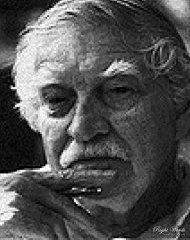May Quotes - Page 283

Ralph Waldo Emerson (2013). “Delphi Complete Works of Ralph Waldo Emerson (Illustrated)”, p.1342, Delphi Classics
Ralph Waldo Emerson (1851). “Essays, lectures and orations”, p.443
Ralph Waldo Emerson (2013). “Delphi Complete Works of Ralph Waldo Emerson (Illustrated)”, p.2433, Delphi Classics
Ralph Waldo Emerson (1866). “The Complete Works of Ralph Waldo Emerson: Comprising His Essays, Lectures, Poems, and Orations”, p.206
A man in the wrong may more easily be convinced than one half right.
Ralph Waldo Emerson (1961). “Journals and Miscellaneous Notebooks of Ralph Waldo Emerson, Volume II: 1822-1826”, p.110, Harvard University Press
Ralph Waldo Emerson (1872). “The Prose Works of Ralph Waldo Emerson: Representative men. English traits. Conduct of life”, p.435
Yet a man may love a paradox, without losing either his wit or his honesty.
Ralph Waldo Emerson (1960). “Journals and Miscellaneous Notebooks: 1841-1843”, p.37, Harvard University Press
"Emerson: The Mind on Fire". Book by Robert D. Richardson (p. 51), March 6, 1995.
Ralph Waldo Emerson, Alfred R. Ferguson (1965). “Journals and Miscellaneous Notebooks of Ralph Waldo Emerson, Volume V: 1835-1838”, p.335, Harvard University Press
Ralph Waldo Emerson, David Mikics (2012). “The Annotated Emerson”, p.204, Harvard University Press
Ralph Waldo Emerson (2012). “Self-Reliance and Other Essays”, p.23, Courier Corporation
Ralph Waldo Emerson (2012). “Essays (Annotated Edition)”, p.122, Jazzybee Verlag
Ralph Waldo Emerson (1851). “Essays, lectures and orations”, p.463
Ralph Waldo Emerson (1872). “The Prose Works of Ralph Waldo Emerson: Representative men. English traits. Conduct of life”, p.144
Human beings may hate a distant enemy in theory, but they generally prefer to kill their neighbors.
Ralph Peters (2007). “Wars of Blood and Faith”, p.295, Stackpole Books






